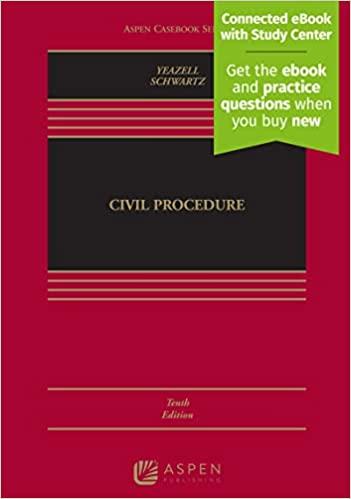Question
Question 1 Facts: Kenya Massey and Raymond Rodriquez entered a Starbucks coffee shop and ordered drinks. Karen Morales, the shift supervisor at the store, told
Question 1
Facts: Kenya Massey and Raymond Rodriquez entered a Starbucks coffee shop and ordered drinks. Karen Morales, the shift supervisor at the store, told Massey and Rodriquez that they could not sit down because the store was closing. When they indicated that they intended to sit and drink the drinks there, Morales instructed a Starbucks employee to cancel Massey's beverage order and refund Massey's money. In a heated verbal exchange, Starbucks employee Melissa Polanco told Massey, "I get off at 10:00, and we can go outside." As the two were leaving, Polanco ran after and caught Massey, punching Massey in the face. Morales jumped on Massey's back, and a scuffle ensued.
Issue: The Starbucks employees who were involved in the altercation were terminated by Starbucks. Massey sued Starbucks for damages for the injuries she suffered. Starbucks moved for summary judgment, alleging that the employees were not acting within the scope of their employment when they assaulted Massey.
Supplemental information: Generally speaking, the "scope of employment" is defined as the range of activities and conduct that an employee is reasonably expected to perform as part of their job.
Questions:
- Why would Starbucks try to argue that the employees were not acting within the scope of their employment in this case?
- Given the facts presented, explain whether you think the employees were acting within the scope of their employment at the time of the scuffle.
- Do you think Starbucks should be held liable for Massey's injuries?
Question 2
Facts: Iota Management Corporation entered into a contract to purchase the Bel Air West Motor Hotel from Boulevard Investment Company. In the warranty, the seller acknowledged no knowledge of any structural damage. When the buyer inspected the premises, no leaks in the pipes were visible. Iota purchased the hotel for $2 million. When Iota removed some of the walls and ceilings during remodeling, it found evidence of prior repairs to leaking pipes and other problems. The estimate to repair these leaks was $500,000.
Evidence at trial showed that Cecil Lillibridge, who was Boulevard's maintenance supervisor for the four years prior to the motor hotel's sale, had actual knowledge of these problems and had repaired some of the pipes.
Questions:
- According to the textbook, what is the legal rule of imputed knowledge?
- Given the facts of the case, do you think Boulevard should be held liable for the cost of repairs to the pipes?
Explain your answer
Step by Step Solution
There are 3 Steps involved in it
Step: 1

Get Instant Access to Expert-Tailored Solutions
See step-by-step solutions with expert insights and AI powered tools for academic success
Step: 2

Step: 3

Ace Your Homework with AI
Get the answers you need in no time with our AI-driven, step-by-step assistance
Get Started


